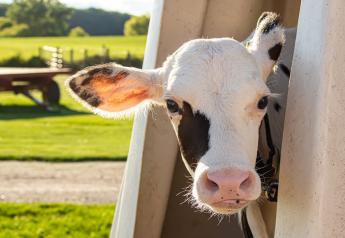Winter Preparedness on Dairy Farms

Source: South Dakota State University Extension
Portions of South Dakota have unfortunately already experienced the first blizzard of the season. Following Winter Storm Atlas, SDSU Extension Dairy Field Specialist, Tracey Renelt urges dairy producers to prepare sooner than later for winter.
Renelt provides dairy producers with a winter check list to help them prepare for winter.
In and around the barn:
* Take the time to pick up the yard of any items that may become buried under a snow bank or may become entangled in a snow blower.
* Put up appropriate snow fence or snow breaks in yards for protection and minimizing of drifts in areas where they are not wanted.
* Consider bringing in any necessary fill or mounding areas that become muddy or troublesome spots in the spring.
* Check curtains on barns to make sure they are operating properly.
* Check any minimum ventilation fans, in particular, to make sure they are functioning properly (i.e. belts tight, blades clean)
* Inspect and repair building roofs and rafters, making sure there is no loose tin or cracked rafters present.
* Do preventative trimming of trees around barns, driveways and fences.
* Move calf hutches to areas that are accessible in the winter and provide wind protection for livestock.
Prepare your equipment for winter:
* Test and service your generator(s) and make sure there is adequate fuel on hand to run them.
* Winterize and service farm equipment such as tractors, semi's, skid loaders, pay loaders, feed mixing wagons, manure pumps, etc. Producers will want to take time to check batteries and fuel filters as these items routinely fail in cold weather.
* Examine snow blowers or other snow removal equipment and make sure it is in proper working order.
* Obtain and store enough fuel (No. 1 Diesel and gasoline) to run equipment for an extended period of time. (A two-week supply is suggested.)
* Check and clean barn heaters to make sure they are operating properly.
Feed and water checklist:
* Clean and check heating elements in all water drinking fountains.
* Repair any water fountains or water lines that may be leaking. Ice buildup is a hazard to livestock.
* Have adequate feed supplies moved in for easy access to the dairy farm. It is recommended to have a two-week supply of purchased feedstuffs.
Keep the animals safe and comfortable:
* Have a two-week supply of veterinary supplies commonly used on the dairy such as antibiotics, intra-mammary mastitis treatments, electrolytes, calcium solutions, antiseptics, bandages, needles, and syringes.
* Make sure there is adequate bedding available for all livestock.
* Examine body condition and hair coat of various groups of livestock.
* Evaluate housing for livestock in open lots, making sure there is adequate wind protection and the ability to get bedding pack built up for them in inclimate weather.
Other miscellaneous items:
* Develop a plan with milk haulers and milk buyers for options if milk is unable to be picked up for an extended period of time.
* Partner with neighbors and develop a plan if it is necessary to do your own snow removal on public access roads.
For more information contact, Renelt at the SDSU Extension Regional Center in Watertown, 605-882-5140 or email at tracey.renelt@sdstate.edu or visit iGrow.org.







